De Amerikaanse schrijfster Dorothy West werd geboren op 2 juni 1907 in Boston. Zie ook mijn blog van 2 juni 2007 en en ook mijn blog van 2 juni 2009 en ook mijn blog van 2 juni 2010
Uit: Mammy
„The young Negro welfare investigator, carrying her briefcase, entered the ornate foyer of the Central Park West apartment house. She was making a collateral call. Earlier in the day she had visited an aging colored woman in a rented room in Harlem. Investigation had proved that the woman was not quite old enough for Old Age Assistance, and yet no longer young enough to be classified as employable. Nothing, therefore, stood in the way of her eligibility for relief. Hers was a clear case of need. This collateral call on her former employer was merely routine.
The investigator walked toward the elevator, close on the heels of a well-dressed woman with a dog. She felt shy. Most of her collaterals were to housewives in the Bronx or supervisors of maintenance workers in office buildings. Such calls were never embarrassing. A moment ago as she neared the doorway, the doorman had regarded her intently. The service entrance was plainly to her left, and she was walking past it. He had been on the point of approaching when a tenant emerged and dispatched him for a taxi. He had stood for a moment torn between his immediate duty and his sense of outrage. Then he had gone away dolefully, blowing his whistle.
The woman with the dog reached the elevator just as the door
slid open. The dog bounded in, and the elevator boy bent and roughhoused with him. The boy’s agreeable face was black, and the investigator felt a flood of relief.
The woman entered the elevator and smilingly faced front. Instantly the smile left her face, and her eyes hardened. The boy straightened, faced front, too, and gaped in surprise. Quickly he glanced at the set face of his passenger.
“Service entrance’s outside,” he said sullenly.
The investigator said steadily, “I am not employed here. I am here to see Mrs. Coleman on business.”
“If you’re here on an errand or somethin’ like that,” he argued doggedly, “you still got to use the service entrance.”
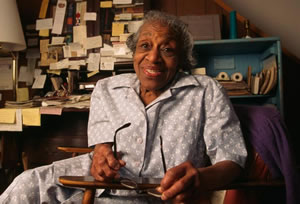
Dorothy West (2 juni 1907 – 16 augustus 1998)
De Engels romanschrijver en dichter Thomas Hardy werd op 2 juni 1840 geboren in Higher Bockhampton, bij Dorchester. Zie ook mijn blog van 2 juni 2010 en eveneens alle tags voor Thomas Hardy op dit blog.
At The Railway Station, Upways
‘There is not much that I can do,
For I’ve no money that’s quite my own!’
Spoke up the pitying child–
A little boy with a violin
At the station before the train came in,–
‘But I can play my fiddle to you,
And a nice one ’tis, and good in tone!’
The man in the handcuffs smiled;
The constable looked, and he smiled too,
As the fiddle began to twang;
And the man in the handcuffs suddenly sang
With grimful glee:
‘This life so free
Is the thing for me!’
And the constable smiled, and said no word,
As if unconscious of what he heard;
And so they went on till the train came in–
The convict, and boy with the violin.
In A Museum
Here’s the mould of a musical bird long passed from light,
Which over the earth before man came was winging;
There’s a contralto voice I heard last night,
That lodges with me still in its sweet singing.
II
Such a dream is Time that the coo of this ancient bird
Has perished not, but is blent, or will be blending
Mid visionless wilds of space with the voice that I heard,
In the full-fuged song of the universe unending.
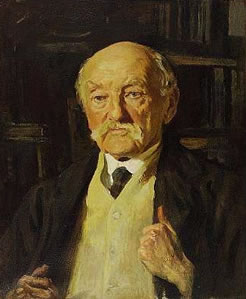
Thomas Hardy (2 juni 1840 – 11 januari 1928)
Portret door Reginald Eves, 1923
De Franse schrijver Donatien Alphonse François, Markies de Sade werd geboren op 2 juni 1740 in Parijs. Zie ook mijn blog van 2 juni 2010 en eveneens alle tags voor Markies de Sade op dit blog.
Uit: Juliette oder Die Wonnen des Lasters (Vertaald door Stefan Zweifel en Michael Pfister)
»Vorwärts! Zum Teufel!« schrie der Herzog, weg mit aller Schonung und damit ließ er ohne anzuhalten mit voller Kraft mehr als zweihundert Rutenstreiche auf meine beiden Arschbacken niedersausen. Während er auf diese Weise arbeitete, kniete sich der Diener vor ihm hin und strengte sich an, dem Unmenschen durch Lutschen am Schwanze, das Gift auszusaugen, das ihn so bösartig machte; endlich schrie der Herzog mit Aufgebot seiner ganzen Lungenkraft: »Ah! Das Saumensch … die Hure … ah! wie verabscheue ich das Weibsgezeug, oh könnte ich das ganze Gezücht mit Rutenhieben ausrotten … Sie blutet … endlich, endlich Blut… ah! zum Henker, sie blutet… sauge zu, Lubin, sauge zu … ich bin glücklich, ich sehe Blut«; hierauf näherte er seinen Mund meinem Arsch und leckte das Blut, das er mit solcher Wonne fließen sieht, sorgfältig auf. Dann fuhr er fort:
»Wie Du siehst, Lubin, will mir der Schwanz noch immer nicht stehen, darum werde ich zuhauen, bis er steht, bis ich abprotze; ei was, das Hurenmensch ist ja jung, das wird’s schon aushalten«. Das blutige Schauspiel beginnt von neuem, nur ändert sich diesmal die Szene, denn Lubin lutscht nicht mehr, sondern er gibt mit einem tüchtigen Ochsenziemer die Hiebe, die sein Herr mir versetzt, diesem hundertfach wieder. — Ich bin mit Blut bedeckt, es läuft mir an den Schenkeln herab, das Piedestal rötet sich; von den Dornen, von den Hieben zerfleischt, wusste ich nicht, welcher Teil meines Körpers mich am meisten schmerzte.”
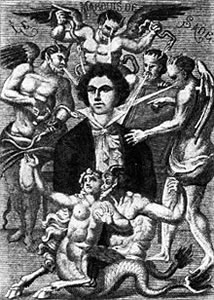
Markies De Sade (2 juni 1740 – 2 december 1814)
Portret doorH. Biberstein in ”L’Œuvre du marquis de Sade”, 1912
De Deense schrijver Karl Adolph Gjellerup werd geboren op 2 juni 1857 in Roholte. Zie ook mijn blog van 2 juni 2007 en en ook mijn blog van 2 juni 2009 en ook mijn blog van 2 juni 2010
Uit:Seit ich zuerst sie sah (Vertaald door Margarete Böttger)
„Das Semester am Polytechnikum war ziemlich anstrengend gewesen, und es begann in Dresden unleidlich heiß zu werden. Außerdem wohnte ich in einer der kleineren Straßen der Altstadt, die zwar reinlich und nett, aber nicht besonders luftig sind. Oft überkam mich ein verzehrendes Heimweh nach dem dänischen Sund. Wie schön auch die Abende an der Elbe waren, sie brachten doch nur geringe Abkühlung, und wenn man sich zwischen neun und zehn Uhr auf die Brühische Terrasse hinaufschleppte, um dort Luft zu schnappen, zeigte das Thermometer noch seine 25-26 Grad Reaumur. Dies war insofern tröstlich, als es einem ein unbestreitbares Recht zum Schwitzen gab und es verzeihlich erscheinen ließ, -wenn man eine Portion Eis vor dem kleinen Cafe Torniamenti genoß, wo es sich so angenehm zwischen den Säulen sitzen ließ, während man Bruchstücken des Konzertes vom »Wienergarten« jenseits des Flusses lauschte.
An einem solchen Abend faßte ich den kühnen Entschluß, die nahe bevorstehenden Som-merferien irgendwo in den Bergen zuzubringen. Mir selbst wenigstens kam dieser Entschluß ziemlich dreist vor, da ich sowohl genötigt als gewohnt war, mich einzuschränken. Am meisten lockte mich die Sächsische Schweiz, und noch war der letzte Eisrest mir kaum im Munde zerschmolzen, als ich mich schon für das kleine Rathen entschieden hatte.“
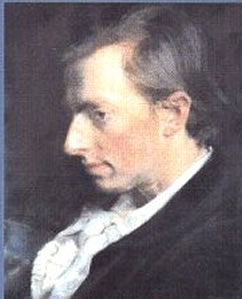
Karl Gjellerup (2 juni 1857 – 11 oktober 1919)
De Engelse schrijfster Barbara Pym werd geboren op 2 juni 1913 in Oswestry, Shropshire. Zie ookmijn blog van 2 juni 2007 en en ook mijn blog van 2 juni 2009 en ook mijn blog van 2 juni 2010
Uit: Jane and Prudence
„Then she realised that it was of course Harvest Festival or Thanksgiving, and the ladies had come to decorate the church. She slipped quietly away behind their backs and found herself in the porch surrounded by fruit, vegetables and flowers.
‘Who was that?’ asked Miss Doggett, the lady in purple, who was elderly with a commanding manner.
‘I think it was the new vicar’s wife,’ said Jessie Morrow, her companion, in an offhand way. ‘It looked like her, I thought.’
‘But why was I not told?’ Miss Doggett raised her voice.
‘What must she have thought of us not even saying good morning?’
Mrs Crampton and Mrs Mayhew stood with their dahlias, expressions of dismay on their faces.
‘She will surely want to help with the decorating,’ said Mrs Crampton, a tall woman with what is thought to be an English type of face, fresh colouring, blue-grey eyes and
rather prominent teeth.
‘I wonder she didn’t introduce herself,’ said Mrs Mayhew, who looked very much like Mrs Crampton. ‘Mrs Pritchard wouldn’t have been so backward, would she? Of course, I did recognise her myself, but I was so surprised at her walking away like that that I couldn’t even say good morning.’
Miss Doggett went out into the porch. ‘Why, she is in the churchyard walking about among the tombs,’ she exclaimed. ‘That long grass must be very wet – I wonder if she is wearing galoshes?’
‘Shall I go and see?’ asked Miss Morrow seriously.“
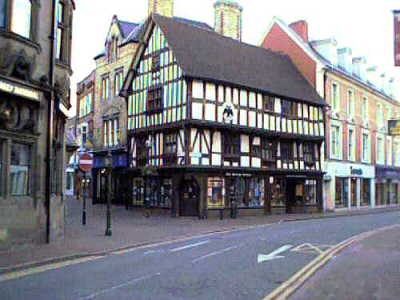
Barbara Pym (2 juni 1913 – 11 januari 1980)
Oswestry
